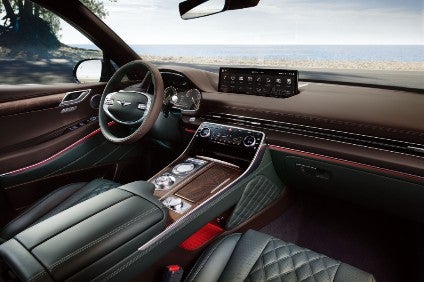
Hyundai Motor Company and Harman International have claimed a world first for a road noise cancellation system just put into production for the automaker’s premium brand Genesis.
The new Road-Noise Active Noise Control (RANC) system is said to reduce unwanted noise by up to 50% and made its debut in the GV80 SUV.

Discover B2B Marketing That Performs
Combine business intelligence and editorial excellence to reach engaged professionals across 36 leading media platforms.
Harman, the wholly-owned subsidiary of Samsung Electronics, developed the system which reduces the interior noise level by cancelling out unwanted sound originating from tyres and road surfaces.
The GV80, revealed in South Korea last month, is the first production car to feature the technology based on the supplier’s HALOsonic suite of noise management technology.
The new Genesis SUV also uses other HALOsonic products.
Harman said sound must be distinguished from noise in cars because it is “a key influencer in customers’ purchasing decisions and wholly contributes to the pleasure of the driving experience”.
Noise on the other hand, is a nuisance; too much can ruin the driving experience. According to a study commissioned by the supplier, end users reported road noise was the biggest auditory distraction for drivers.
Customers demand sharper vehicle handling, fuel efficiency, stiffer suspensions and wider low-profile tyres but measures to address those needs offer multiple paths for unwanted noise to be transmitted through the structure of the vehicle, ultimately creating a droning noise in the cabin which is both distracting and tiring. Applying conventional, passive noise, vibration and harshness (NVH) methods to reduce this intrusive noise significantly adds to the vehicle weight with a further negative effect on fuel economy and CO2 emission levels.
Though it’s not an entirely new trick for automakers, Harman’s RANC system actively reduces noise by emitting sound waves inverted to the incoming noise.
How it works
The RANC control processor uses reference signals received from acceleration sensors placed in the suspension and chassis to predict noise transferred into the cabin and to generate an anti-noise wave in real-time. Compute time and signal transfer speed are optimised to allow for an analysis of the intruding noise and the generation of the anti-noise within milliseconds, thereby preventing the noise from reaching occupant ears. Error microphones constantly monitor the system performance in each seat location to ensure a more pleasant ride for all vehicle occupants.
Partnership
RANC system is the result of years of research and continuous development, bringing together the expertise, R&D capacities and IP patents of HMC and Harman’s development of the HALOsonic noise management products. The co-development and introduction of this first-ever active road noise cancellation system on a production vehicle, is another milestone in the successful collaboration between supplier and automaker; Harman also supplies HMC brands audio systems.
The HALOsonic suite includes Engine Order Cancellation (EOC) and Electronic Sound Synthesis solution (ESS) to both enhance engine sound inside the vehicle (internal ESS) and create new sounds for hybrid and electric vehicles to comply with applicable AVAS regulations (external ESS).






